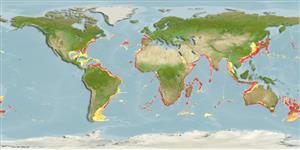Elasmobranchii (tubarões e raias) (sharks and rays) >
Lamniformes (Mackerel sharks) >
Mitsukurinidae (Goblin shark)
Etymology: Mitsukurina: -ina (L.), belonging to: University of Tokyo zoologist Kakichi Mitsukuri (1858-1909), who placed holotype (provided by Alan Owson, see species) of this “very remarkable shark” in Jordan’s “hands to be identified, figured, and described” (See ETYFish); owstoni: In honor of Alan Owston (1853-1915), English businessman, yachtsman, collector of Asian wildlife, and resident of Yokohama, Japan, who secured holotype from a fisherman (named for Owston at the request of Kakichi Mitsukuri, see genus) (See ETYFish).
Eponymy: Dr Kakichi Mitsukuri (1857–1909) was a Japanese zoologist who first went to the USA (1873) and achieved doctorates from Yale (1879) and from Johns Hopkins University (1883). [...] Alan Owston (1853–1915) was an English businessman who was a collector of Asian wildlife, as well as a yachtsman. [...] (Ref. 128868), visit book page.
More on author: Jordan.
Environment: milieu / climate zone / depth range / distribution range
Ecologia
marinhas batidemersal; intervalo de profundidade 30 - 1300 m (Ref. 43278), usually 270 - 960 m (Ref. 43278). Deep-water; 48°N - 55°S, 180°W - 180°E
Western Atlantic: Guyana (Ref. 6871), Suriname (Ref. 13608, 11228) and French Guiana. Eastern Atlantic: France (Bay of Biscay), Madeira, Portugal, and South Africa. Western Indian Ocean: off South Africa. Western Pacific: Japan, Australia (South Australia, New South Wales), New Zealand (Ref. 26346). Eastern Pacific: USA (southern California) (Ref. 43278).
Comprimento de primeira maturação / Tamanho / Peso / Idade
Maturity: Lm 293.0, range 264 - 322 cm
Max length : 617 cm TL macho/indeterminado; (Ref. 83323); common length : 200 cm TL macho/indeterminado; (Ref. 5217)
Descrição suscinta
Chaves de identificação | Morfologia | Morfometria
Espinhos dorsais (total) : 0; Espinhos anais: 0. Flat, bladelike, elongated snout, tiny eyes without nictitating eyelids, soft, flabby body, slender, very long cusped teeth in long, protrusible jaws, long caudal fin without a ventral lobe (Ref. 247). Pinkish-white with bluish fins, becoming brownish grey after death (Ref. 5578, 11228).
Found on outer continental shelves and upper slopes, but rarely in shallow water close inshore (Ref. 247, 43278). Jaws are highly specialized for rapid projection from the head to snap up small animals (Ref. 247). Feeds on jacopever, pelagic octopus and crabs (Ref. 5578). Ovoviviparous, embryos feeding on yolk sac and other ova produced by the mother (Ref. 50449). Probably slow-moving and neutrally buoyant (Ref. 6871). Utilized dried salted (Ref. 247)
Ciclo de vida ou comportamento de acasalamento
Maturidade | Reprodução | Desova | Ovos | Fecundidade | Larvas
Exhibit ovoviparity (aplacental viviparity), with embryos feeding on other ova produced by the mother (oophagy) after the yolk sac is absorbed (Ref. 247, 50449). Distinct pairing with embrace (Ref. 205).
Compagno, L.J.V., 1984. FAO Species Catalogue. Vol. 4. Sharks of the world. An annotated and illustrated catalogue of shark species known to date. Part 1 - Hexanchiformes to Lamniformes. FAO Fish. Synop. 125(4/1):1-249. Rome, FAO. (Ref. 247)
Status na Lista Vermelha da UICN (Ref. 130435: Version 2024-2)
Uso pelos humanos
Pescarias:
Ferramentas
Relatórios especiais
Baixar XML
Fontes da internet
Estimates based on models
Preferred temperature (Ref.
123201): 3.8 - 13.7, mean 8.3 °C (based on 1037 cells).
Índice de diversidade filogenética (Ref.
82804): PD
50 = 1.5000 [Uniqueness, from 0.5 = low to 2.0 = high].
Bayesian length-weight: a=0.00389 (0.00180 - 0.00842), b=3.12 (2.94 - 3.30), in cm total length, based on all LWR estimates for this body shape (Ref.
93245).
Nível Trófico (Ref.
69278): 4.1 ±0.62 se; based on food items.
Resiliência (Ref.
120179): Muito baixo(a), tempo mínimo de duplicação da população maior que 14 anos (Fec assumed to be <10).
Fishing Vulnerability (Ref.
59153): Very high vulnerability (90 of 100).
